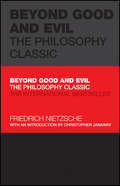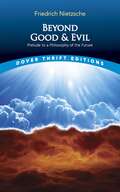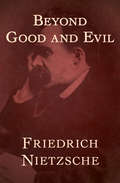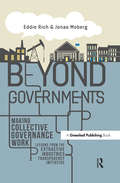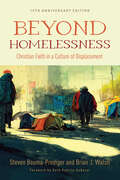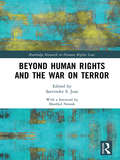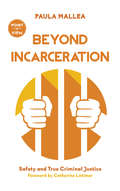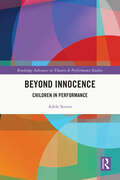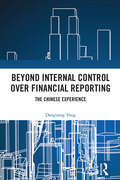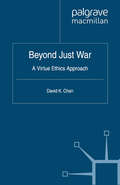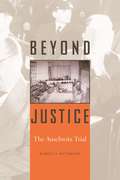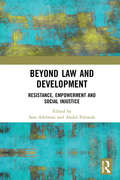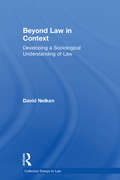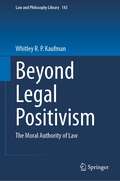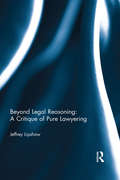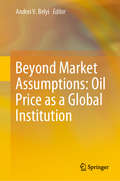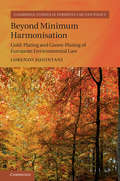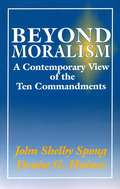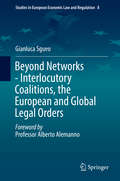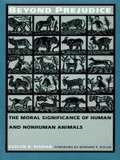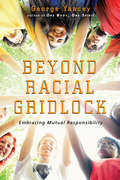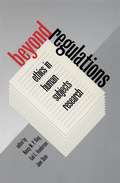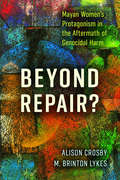- Table View
- List View
Beyond Good and Evil: The Philosophy Classic (Capstone Classics)
by Friedrich NietzscheA deluxe, high-quality edition of Friedrich Nietzsche’s seminal work Beyond Good and Evil is one of the final books by German philosopher Friedrich Nietzsche. This landmark work continues to be one of the most well-known and influential explorations of moral and ethical philosophy ever conceived. Expanding on the concepts from his previous work Thus Spoke Zarathustra, Nietzsche adopts a polemic approach to past philosophers who, in his view, lacked critical sense in accepting flawed premises in their consideration of morality. The metaphysics of morality, Nietzsche argues, should not assume that a good man is simply the opposite of an evil man, rather merely different expression of humanity’s common basic impulses. Controversial in its time, as well as hotly debated in the present, Nietzsche’s work moves beyond conventional ethics to suggest that a universal morality for all human beings in non-existent – perception, reason and experience are not static, but change according to an individual’s perspective and interpretation. The work further argues that philosophic traditions such as “truth,” “self-consciousness” and “free will” are merely inventions of Western morality and that the “will to power” is the real driving force of all human behaviour. This volume: Critiques the belief that actions, including domination or injury to the weak, can be universally objectionable Explores themes of religion and “master and slave” morality Includes a collection of stunning aphorisms and observations of the human condition Part of the bestselling Capstone Classics Series edited by Tom Butler-Bowdon,this collectible, hard-back edition of Beyond Good and Evil provides an accessible and insightful Introduction by leading Nietzsche authority Dr Christopher Janaway. This deluxe volume is perfect for anyone with interest in philosophy, psychology, science, history and literature.
Beyond Good and Evil: Prelude to a Philosophy of the Future (Dover Thrift Editions)
by Friedrich NietzscheAfter kicking open the doors to twentieth-century philosophy in Thus Spake Zarathustra, Friedrich Nietzsche refined his ideal of the superman with the 1886 publication of Beyond Good and Evil. Conventional morality is a sign of slavery, Nietzsche maintains, and the superman goes beyond good and evil in action, thought, and creation. Nietzsche especially targets what he calls a "slave morality" that fosters herdlike quiescence and stigmatizes the "highest human types."In this pathbreaking work, Nietzsche's philosophical and literary powers are at their height: with devastating irony and flashing wit he gleefully dynamites centuries of accumulated conventional wisdom in metaphysics, morals, and psychology, clearing a path for such twentieth-century innovators as Thomas Mann, André Gide, Sigmund Freud, George Bernard Shaw, André Malraux, and Jean-Paul Sartre, all of whom openly acknowledged their debt to him.Students of philosophy and literature as well as general readers will prize this rich sampling of Nietzsche's thought in an unabridged and inexpensive edition of one of the philosopher's most important works.
Beyond Good and Evil: Prelude To A Philosophy Of The Future (Barnes And Noble Library Of Essential Reading Ser.)
by Friedrich NietzscheFriedrich Nietzsche's trailblazing, incendiary book sets dogmatic philosophy and traditional morality alight One of the most important works in philosophical history, Beyond Good and Evil consists of 296 sections and a final "aftersong." Therein, Nietzsche articulates his views on philosophy, philosophers, morality, religion, society, people, and culture. As challenging as it is rewarding, Beyond Good and Evil will command you, confront you, and provoke you into reconsidering your perception of the modern world. This ebook has been professionally proofread to ensure accuracy and readability on all devices.
Beyond Good and Evil
by Friedrich Nietzsche'One of the greatest books of a very great thinker' Michael TannerBeyond Good and Evil confirmed Nietzsche's position as the towering European philosopher of his age. The work dramatically rejects traditional Western thought with its notions of truth and God, good and evil. Nietzsche seeks to demonstrate that the Christian world is steeped in a false piety and infected with a 'slave morality'. With wit and energy, he turns from this critique to a philosophy that celebrates the present and demands that the individual impose their own 'will to power' upon the world.Translated by R. J. HOLLINGDALE With an Introduction by MICHAEL TANNER
Beyond Governments: Making Collective Governance Work - Lessons from the Extractive Industries Transparency Initiative
by Eddie Rich Jonas MobergIn a world characterized by globalization, governments increasingly find themselves unable to govern. Corruption is everywhere, natural resources are being exploited, the environment damaged, markets distorted, and the fight against poverty is often ineffective. Certain challenges cannot be addressed by governments alone. Increasingly, collective governance “beyond governments” is seen as part of the solution, with state and non-state actors working together. This book sets out a framework for those wishing to implement collective governance, involving civil society, companies and governments as key actors. Based on over eight years of running the most advanced example of collective governance at international level, the Head and Deputy Head of the Extractive Industries Transparency Initiative (EITI) outline the practicalities and pitfalls, and draw out the experience of the EITI as a case example. Beyond Governments tells a positive story of how this type of innovative governance can make real achievements, but also cautions against those who see collective governance as a silver bullet to solve development challenges. It provides practical guidance from a practitioner’s perspective and is essential reading for those in government, business and academia.
Beyond Homelessness, 15th Anniversary Edition: Christian Faith in a Culture of Displacement
by Steven Bouma-Prediger Brian J. WalshEnvision a future beyond homelessness. The rise in homeless encampments. The destruction of our planet. The disconnection from place caused by capitalism and technology. Beyond the unavailability of housing, our culture is experiencing a devastating loss of home.In Beyond Homelessness, Steven Bouma-Prediger and Brian Walsh illuminate the relationship between socioeconomic, ecological, and cultural homelessness. Bouma-Prediger and Walsh blend groundbreaking scholarship with stirring biblical meditations, while enriching their discussion with literature, music, and art. Offering practical solutions and a hope-filled vision of home, they show how to heal the profound dislocations in our society. In this fifteenth-anniversary edition, the authors return to their work with a new postscript, in which they discuss the evolution of their ideas and share true stories of home and community built anew. This revitalized classic is a must-read for any Christian committed to social justice—and anyone longing for home.
Beyond Human Rights and the War on Terror (Routledge Research in Human Rights Law)
by Satvinder S. JussThis edited collection provides a comprehensive, insightful, and detailed study of a vital area of public policy debate as it is currently occurring in countries across the world from India to South Africa and the United Kingdom to Australia. Bringing together academics and experts from a variety of jurisdictions, it reflects upon the impact on human rights of the application of more than a decade of the "War on Terror" as enunciated soon after 9/11. The volume identifies and critically examines the principal and enduring resonances of the concept of the "War on Terror". The examination covers not only the obvious impacts but also the more insidious and enduring changes within domestic laws. The rationale for this collection is therefore not just to plot how the "War on Terror" has operated within the folds of the cloak of liberal democracy, but how they render that cloak ragged, especially in the sight of those sections of society who pay the heaviest price in terms of their human rights. This book engages with the public policy strand of the last decade that has arguably most shaped perceptions of human rights and engendered debates about their worth and meaning. It will be of interest to researchers, academics, practitioners, and students in the fields of human rights law, criminal justice, criminology, politics, and international studies.
Beyond Incarceration: Safety and True Criminal Justice
by Paula Mallea Catherine LatimerA call to replace Canada’s incarceration model, which has proven destructive, discriminatory, expensive, counterproductive, and — most of all — unnecessary. Imprisonment developed in the Western world as the punishment to suit all offences, from violent assault to victimless drug use. Centuries ago, incarcerating convicts represented progress on society’s part, since it came as a replacement for capital punishment, maiming, and torture. Our current model — taking away convicts’ freedom and holding them in degrading and unhealthy prison conditions — promotes recidivism and jeopardizes public safety. It is highly discriminatory, with disproportionate numbers of ethnic, indigenous, mentally ill, drug-dependent, poor, and otherwise marginalized people imprisoned. It is also ruinously expensive. Elsewhere, alternative correctional systems successfully rehabilitate offenders while treating them with dignity and respect. This book lays out the case for a complete overhaul of Canada’s ineffective incarceration model of criminal justice and for a new approach.
Beyond Innocence: Children in Performance (ISSN)
by Adele SeniorOn a global platform we are witnessing the increased visibility of the people we call children and teenagers as political activists.Meanwhile, across the contemporary performance landscape, children are participating as performers and collaborators in ways that resonate with this figure of the child activist. Beyond Innocence: Children in Performance proposes that performance has the ability to offer alternatives to hegemonic perceptions of the child as innocent, in need of protection, and apolitical. Through an in-depth analysis of selected performances shown in the UK within the past decade, alongside newly gathered documentation on children’s participation in professional performance in their own words, this book considers how performance might offer more capacious representations of and encounters with children beyond the nostalgic and protective adult gaze elicited within mainstream contexts. Motivated by recent collaborations with children on stage that reimagine the figure of the child, the book offers a new approach to both reading age in performance and also doing research with children rather than on or about them. By redressing the current imbalance between the way that we read children and adults’ bodies in performance and taking seriously children’s cultures and experiences, Beyond Innocence asks what strategies contemporary performance has to offer both children and adults in order to foster shared spaces for social and political change. As such, the book develops an approach to analysing performance that not only recognises children as makers of meaning but also as historically, politically, and culturally situated subjects and bodies with lived experiences that far exceed the familiar narratives of innocence and inexperience that children often have to bear.
Beyond Internal Control over Financial Reporting: The Chinese Experience
by Daoguang YangBy examining two different modes of internal control and the fundamentals of risk management, this book analyses the role of internal control in financing, investment, profit distribution, and corporate strategies through China's experience. In doing so, it confirms the effectiveness and superiority of internal control over operation and management. The book compares the various internal control methods used in China and the USA, namely, operation and management-oriented versus financial reporting-oriented approaches. It also discusses the differences in corporate risk attitudes and behaviours under the two approaches. The author then proposes the hyper-correction hypothesis and the trimming hypothesis. Empirical findings regarding corporate cash policy, mergers and acquisitions, tax avoidance, and diversification strategy reveal that internal control in China does not result in undue risk aversion but instead manages enterprise risk within a reasonable capacity. These results support the trimming hypothesis and demonstrate that internal control is a useful risk management tool. The title will appeal to students, academics, and accounting professionals interested in internal control (risk management), accounting, auditing and corporate finance, regulation and governance.
Beyond Just War: A Virtue Ethics Approach
by David K. ChanUnlike most books on the ethics of war, this book rejects the 'just war' tradition, proposing a virtue ethics of war to take its place. Like torture, war cannot be justified. It answers the question: 'If war is a very great evil, would a leader with courage, justice, compassion, and all the other moral virtues ever choose to fight a war?'
Beyond Justice: The Auschwitz Trial
by Rebecca WittmannIn 1963, West Germany was gripped by a dramatic trial of former guards who had worked at the Nazi death camp Auschwitz. It was the largest and most public trial to take place in the country and attracted international attention. Using the pretrial files and extensive trial audiotapes, Rebecca Wittmann offers a fascinating reinterpretation of Germany's first major attempt to confront its past. Evoking the courtroom atmosphere, Wittmann vividly recounts the testimony of survivors, former SS officers, and defendants--a cross-section of the camp population. Attorney General Fritz Bauer made an extraordinary effort to put the entire Auschwitz complex on trial, but constrained by West German murder laws, the prosecution had to resort to standards for illegal behavior that echoed the laws of the Third Reich. This provided a legitimacy to the Nazi state. Only those who exceeded direct orders were convicted of murder. This shocking ruling was reflected in the press coverage, which focused on only the most sadistic and brutal crimes, allowing the real atrocity at Auschwitz--mass murder in the gas chambers--to be relegated to the background. The Auschwitz trial had a paradoxical result. Although the prosecution succeeded in exposing SS crimes at the camp for the first time, the public absorbed a distorted representation of the criminality of the camp system. The Auschwitz trial ensured that rather than coming to terms with their Nazi past, Germans managed to delay a true reckoning with the horror of the Holocaust.
Beyond Law and Development: Resistance, Empowerment and Social Injustice
by Sam AdelmanThe book highlights new imaginaries required to transcend traditional approaches to law and development. The authors focus on injustices and harms to people and the environment, and confront global injustices involving impoverishment, patriarchy, forced migration, global pandemics and intellectual rights in traditional medicine resulting from maldevelopment, bad governance and aftermaths of colonialism. New imaginaries emphasise deconstruction of fashionable myths of law, development, human rights, governance and post-coloniality to focus on communal and feminist relationality, non-western legal systems, personal responsibility for justice and forms of resistance to injustices. The book will be of interest to students and scholars of development, law and development, feminism, international law, environmental law, governance, politics, international relations, social justice and activism.
Beyond Law in Context: Developing a Sociological Understanding of Law (Collected Essays in Law)
by David NelkenThis intriguing collection of essays by David Nelken examines the relationship between law, society and social theory and the various ideas social theorists have had about the actual and ideal 'fit' between law and its social context. It also asks how far it is possible to get beyond this mainstream paradigm. The value of social theorising for studying law is illustrated by specific developments in substantive areas such as housing law, tort law, the law of evidence and criminal law. Throughout the chapters the focus is on the following questions. What is gained (and what may be lost) by putting law in context? What attempts have been made to go beyond this approach? What are their (necessary) limits? Can law be seen as anything other than in some way both separate from and relating to 'the social'? The distinctiveness of this approach lies in its effort to keep in tension two claims. Firstly, that social theorising about legal practices is vitally important for understanding the connections between legal and social structures and revealing what law means and does for (and to) various social actors. The second point is that it does not follow that what we learn in this way can be assumed to be necessarily relevant to (re)shaping legal practices without further argument that pays heed to law's specificity.
Beyond Legal Positivism: The Moral Authority of Law (Law and Philosophy Library #143)
by Whitley R. KaufmanLegal Positivism has been the dominant school of legal philosophy for much of the last century, despite its many critics. Its central tenet has long been that there is no necessary connection between law and morality. This book provides a broad but clear and jargon-free account of the central objections to the theory and why those objections are sufficient to show that legal positivism is no longer tenable. This includes a broad critique of the purported distinction method of legal positivism, the idea of ‘conceptual analysis,’ as well as a detailed assessment of the most influential of all legal positivist theories, that of H.L.A. Hart. The book also provides a defense of the natural law school, which holds in contrast to legal positivism that the authority of law arises from its intrinsic connection to morality. The author demonstrates that most of the criticism of the natural law school arises from a caricatured account of that doctrine, for instance the idea that it requires substantive theological commitments or particular conceptions of human nature. In contrast, the author presents an account of natural law theory that is grounded in a commitment to moral truth, but not to any theological beliefs. The nature of law can only be understood in terms of its moral function, to provide a clear set of moral rules that are required for a society to function effectively.
Beyond Legal Reasoning: a Critique of Pure Lawyering
by Jeffrey LipshawThe concept of learning to ‘think like a lawyer’ is one of the cornerstones of legal education in the United States and beyond. In this book, Jeffrey Lipshaw provides a critique of the traditional views of ‘thinking like a lawyer’ or ‘pure lawyering’ aimed at lawyers, law professors, and students who want to understand lawyering beyond the traditional warrior metaphor. Drawing on his extensive experience at the intersection of real world law and business issues, Professor Lipshaw presents a sophisticated philosophical argument that the "pure lawyering" of traditional legal education is agnostic to either truth or moral value of outcomes. He demonstrates pure lawyering’s potential both for illusions of certainty and cynical instrumentalism, and the consequences of both when lawyers are called on as dealmakers, policymakers, and counsellors. This book offers an avenue for getting beyond (or unlearning) merely how to think like a lawyer. It combines legal theory, philosophy of knowledge, and doctrine with an appreciation of real-life judgment calls that multi-disciplinary lawyers are called upon to make. The book will be of great interest to scholars of legal education, legal language and reasoning as well as professors who teach both doctrine and thinking and writing skills in the first year law school curriculum; and for anyone who is interested in seeking a perspective on ‘thinking like a lawyer’ beyond the litigation arena.
Beyond Market Assumptions: Oil Price as a Global Institution
by Andrei V. BelyiThis book defines oil price as a social institution that exists beyond supply-demand mechanisms. Discussing oil markets in the context of the broader sociology of prices, it covers a number of theoretical and practical dimensions, such as new market uncertainties and trends, and social perceptions of energy security and of power. Further, based on case studies it explores the implications for OPEC, Russia, and Central and Eastern Europe, as well as for the energy transition and for international investment arbitration. Featuring contributions from leading academics, researchers and business professionals, the book offers an interdisciplinary perspective on the oil price.“This book brings together an impressive team of scholars with fresh perspectives on the oil price. Even as the world attempts energy transition, oil consumption continues and the oil price is likely to become even more unpredictable and unclear than in the past. This book helps make sense of this challenging topic.”-Indra Overland is a Research Professor and Head of Centre for Energy Research, Norwegian Institute of International Affairs (NUPI)“A revealing and multidimensional analysis of oil price fluctuations in a market that seeks less uncertainty. This book discusses market and price evolution in the context of market theories, history and real-time market analysis. A welcome and timely contribution to our understanding of global energy markets.”Dr. Sara Vakhshouri is Founder and President of SVB Energy International and Professor of Energy Security at the Institute of World Politics.
Beyond Minimum Harmonisation: Gold-Plating and Green-Plating of European Environmental Law (Cambridge Studies in European Law and Policy)
by Lorenzo SquintaniThis book explains the functioning of shared competences in environmental protection by focusing on member states' interaction with the EU framework. By studying this interaction, Squintani reveals room for improving the level of environmental protection, legal certainty, and efficiency of the system for environmental protection envisaged under the EU Treaties. Accordingly, this book makes a contribution to EU environmental law and policy, but also should be of interest to constitutional lawyers more generally and to scholars working in any field of EU policy and law in which minimum harmonisation is used. Thanks to its focus and clear, accessible prose, this book is also valuable additional reading material for environmental law courses, and to those involved in decision-making in the EU.
Beyond Moralism
by John Shelby SpongThis thought-provoking guide takes a candid look at the moral issues we face in our daily lives. Using the Ten Commandments as a starting point, the authors bring fresh analysis to such problems as the morality of war in a nuclear age, equitable tax structures, abortion, marital fidelity, capital punishment, care of aging parents, euthanasia, homosexuality, and other contemporary concerns. Beyond Moralism offers solid guidance that is consistent with the Word of God as heard throughout the ages.
Beyond Networks - Interlocutory Coalitions, the European and Global Legal Orders (Studies in European Economic Law and Regulation #8)
by Gianluca SgueoThisbook explores the activism promoted by organised networks of civil society actorsin opening up possibilities for more democratic supranational governance. Itexamines the positive and negative impact that such networks of civil societyactors - named "interlocutory coalitions" - may have on the convergence ofprinciples of administrative governance across the European legal system andother supranational legal systems. Thebook takes two main controversial aspects into account: the first relates tothe convergence between administrative rules pertaining to differentsupranational regulatory systems. Traditionally, the spread of methods ofadministrative governance has been depicted primarily against the background ofthe interactions between the domestic and the supranational arena, both from atop-down and bottom-up perspective. However, the exploration of interactionsoccurring at the supranational level between legal regimes is still notgrounded on adequate empirical evidence. The second controversial aspectconsidered in this book consists of the role of civil society actors operatingat the supranational level. In its discussion of the first aspect, the bookfocuses on the relations between the European administrative law and theadministrative principles of law pertaining to other supranational regulatoryregimes and regulators, including the World Bank, the International MonetaryFund, the World Trade Organization, the United Nations, the Organization forEconomic Cooperation and Development, the Asian Development Bank, and theCouncil of Europe. The examination of the second aspect involves theexploration of the still little examined, but crucial, role of civil societyorganised networks in shaping global administrative law. These "interlocutorycoalitions" include NGOs, think tanks, foundations, universities, andoccasionally activists with no formal connections to civil society organisations. The book describes such interlocutory coalitions as drivers of harmonizedprinciples of participatory democracy at the European and global levels. However, interlocutory coalitions show a number of tensions (e. g. thegovernability of coalitions, the competition among them) that may hamper the impactthey have on the reconfiguration of individuals' rights, entitlements andresponsibilities in the global arena.
Beyond Prejudice: The Moral Significance of Human and Nonhuman Animals
by Evelyn B. PluharIn Beyond Prejudice, Evelyn B. Pluhar defends the view that any sentient conative being--one capable of caring about what happens to him or herself--is morally significant, a view that supports the moral status and rights of many nonhuman animals. Confronting traditional and contemporary philosophical arguments, she offers in clear and accessible fashion a thorough examination of theories of moral significance while decisively demonstrating the flaws in the arguments of those who would avoid attributing moral rights to nonhumans.Exposing the traditional view--which restricts the moral realm to autonomous, fully fledged "persons"--as having horrific implications for the treatment of many humans, Pluhar goes on to argue positively that sentient individuals of any species are no less morally significant than the most automomous human. Her position provides the ultimate justification that is missing from previous defenses of the moral status of nonhuman animals. In the process of advancing her position, Pluhar discusses the implications of determining moral significance for children and "abnormal" humans as well as its relevance to population policies, the raising of animals for food or product testing, decisions on hunting and euthanasia, and the treatment of companion animals. In addition, the author scrutinizes recent assertions by environmental ethicists that all living things or that natural objects and ecosystems be considered highly morally significant. This powerful book of moral theory challenges all defenders of the moral status quo--which decrees that animals decidedly do not count--to reevaluate their convictions.
Beyond Race, Sex, and Sexual Orientation
by Sonu BediThe conventional interpretation of equality under the law singles out certain groups or classes for constitutional protection: women, racial minorities, and gays and lesbians. The United States Supreme Court calls these groups 'suspect classes'. Laws that discriminate against them are generally unconstitutional. While this is a familiar account of equal protection jurisprudence, this book argues that this approach suffers from hitherto unnoticed normative and political problems. The book elucidates a competing, extant interpretation of equal protection jurisprudence that avoids these problems. The interpretation is not concerned with suspect classes but rather with the kinds of reasons that are already inadmissible as a matter of constitutional law. This alternative approach treats the equal protection clause like any other limit on governmental power, thus allowing the Court to invalidate equality-infringing laws and policies by focusing on their justification rather than the identity group they discriminate against.
Beyond Racial Gridlock: Embracing Mutual Responsibility
by George YanceyChristians have struggled with racial issues for centuries, and often inadvertently contribute to the problem. Many proposed solutions have been helpful, but these only take us so far. Adding to this complex situation is the reality that Christians of different races see the issues differently. Sociologist George Yancey surveys a range of approaches to racial healing that Christians have used and offers a new model for moving forward. The first part of the book analyzes four secular models regarding race used by Christians (colorblindness, Anglo-conformity, multiculturalism and white responsibility) and shows how each has its own advantages and limitations. Part two offers a new "mutual responsibility" model, which acknowledges that both majority and minority cultures have their own challenges, tendencies, and sins to repent of, and that people of different races approach racial reconciliation and justice in differing but complementary ways. Yancey's vision offers hope that people of all races can walk together on a shared path--not as adversaries, but as partners.
Beyond Regulations
by Gail E. Henderson Nancy M. King Jane SteinAcross a broad range of disciplines--in medicine, social science, and the humanities--researchers, scholars, teachers, and administrators increasingly are looking for new ways to approach ethical issues in research with human subjects. Questions about how relationships between funders and researchers should affect research design, for example, or whether the potential benefits of research can outweigh the importance of its subjects' interests are inadequately addressed by the prevailing, regulation-based research ethics paradigm. This book constitutes a reexamination of research ethics. It combines case studies and commentaries by a multidisciplinary group of scholars and researchers to explore such topics as informed consent, conflict of interest, confidentiality, and research on illegal behavior. All human subjects research takes place within complex social, cultural, and political contexts, the contributors argue. Increased consideration of the relationships between researchers and their subjects, funders, and institutions within these contexts will facilitate research that is sensitive and responsible as well as scientifically fruitful.Beyond Regulations features a keynote essay by Ruth Macklin. Other contributors are Marcela Aracena Alvarez, Jorge Balan, B. Susan Bauer, Alan F. Benjamin, Lynn Blanchard, Allan M. Brandt, J. Pat Browder, Barbara Entwisle, Sue E. Estroff, Renee C. Fox, Lara Freidenfelds, Gail E. Henderson, Nancy M. P. King, Loretta M. Kopelman, Ernest N. Kraybill, Barry M. Popkin, Silvina Ramos, Desmond K. Runyan, Jane Stein, Ronald P. Strauss, Keith A. Wailoo, and Cynthia Waszak.Across a broad range of disciplines--in biomedicine, the social sciences, and the humanities--researchers, scholars, administrators, and teachers increasingly struggle with questions of ethics in research with human subjects. All research takes place in complex social, cultural, political, and economic contexts; yet the prevailing principle-based research ethics paradigm does not adequately account for them. This book reexamines research ethics using a new relationships paradigm. Through in-depth cases, commentaries, and essays, a multidisciplinary group of scholars and researchers addresses informed consent, conflict of interest, confidentiality, and other issues, considering questions like: What relationships should researchers have with their subjects' communities? When researchers and subjects have different views about research, who should have control? How should relationships between funders and researchers affect research design? Can research be so potentially beneficial that its importance outweighs the interests of subjects? Examining the relationships between researchers and subjects, communities, funders, and institutions--including considerations of authority and voice--can facilitate human subjects research that is morally sensitive and responsible as well as scientifically fruitful.
Beyond Repair?: Mayan Women’s Protagonism in the Aftermath of Genocidal Harm (Genocide, Political Violence, Human Righ)
by Alison Crosby M. Brinton LykesBeyond Repair? explores Mayan women’s agency in the search for redress for harm suffered during the genocidal violence perpetrated by the Guatemalan state in the early 1980s at the height of the thirty-six-year armed conflict. The book draws on eight years of feminist participatory action research conducted with fifty-four Q’eqchi’, Kaqchikel, Chuj, and Mam women who are seeking truth, justice, and reparation for the violence they experienced during the war, and the women’s rights activists, lawyers, psychologists, Mayan rights activists, and researchers who have accompanied them as intermediaries for over a decade. Alison Crosby and M. Brinton Lykes use the concept of “protagonism” to deconstruct dominant psychological discursive constructions of women as “victims,” “survivors,” “selves,” “individuals,” and/or “subjects.” They argue that at different moments Mayan women have been actively engaged as protagonists in constructivist and discursive performances through which they have narrated new, mobile meanings of “Mayan woman,” repositioning themselves at the interstices of multiple communities and in their pursuit of redress for harm suffered.
